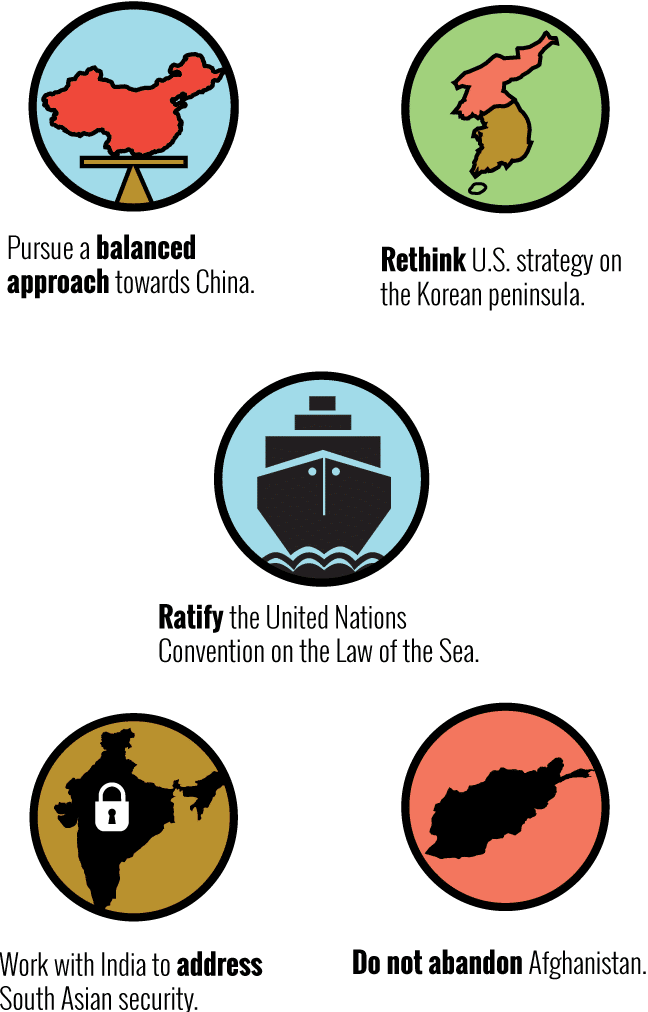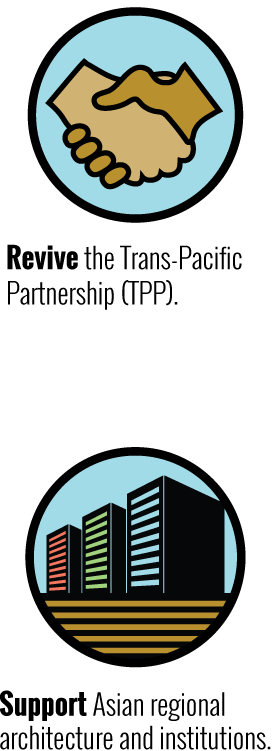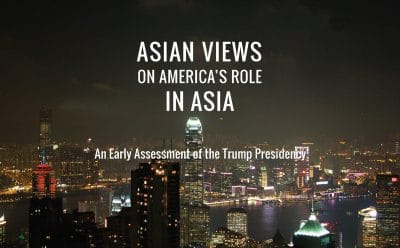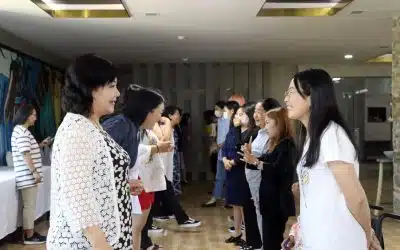Asian Views on America’s Role in Asia: The Future of the Rebalance
Strategic Recommendations for the Incoming U.S. President on Foreign Policy Towards Asia
The Asia Foundation’s signature foreign policy initiative brings together diverse perspectives from influential Asian thought leaders on U.S. foreign policy priorities in Asia. Prepared in the lead up to the 2016 election, and arriving on the eve of possibly the greatest change in American foreign policy in Asia since the end of World War II, the report contains a set of strategic recommendations for the incoming administration—including a concise top 10—emphasizing that the U.S. must not shrink from its leadership role in the international order.

Maintain a robust, sustained,
and consistent American
presence in the Asia-Pacific.
Strategic Recommendations for the Incoming U.S. President on Foreign Policy Towards Asia
The Asia Foundation’s signature foreign policy initiative brings together diverse perspectives from influential Asian thought leaders on U.S. foreign policy priorities in Asia. Prepared in the lead up to the 2016 election, and arriving on the eve of possibly the greatest change in American foreign policy in Asia since the end of World War II, the report contains a set of strategic recommendations for the incoming administration—including a concise top 10—emphasizing that the U.S. must not shrink from its leadership role in the international order.
Hear more insights from report authors
If the United States, rich with experience in global leadership, retreats in this situation, there will certainly be a leadership vacuum.
Northeast Asia Chair, Asian Views on America’s Role in Asia; Professor of International Relations, Seoul National University; and Former Foreign Minister of the Republic of Korea
Recommendations on Security and Diplomacy
Asian nations value America’s economic and security presence. While bilateral relations are important, multilateral mechanisms and diplomacy that promote greater cohesion among Asian countries are essential to America’s rebalancing policy.
Pursue a balanced approach towards China.
Ratify the United Nations Convention on the Law of the Sea.
Rethink U.S. strategy on the Korean peninsula.

Work with India to address
South Asian security.
Do not abandon Afghanistan.
Recommendations on Security and Diplomacy
Asian nations value America’s economic and security presence. While bilateral relations are important, multilateral mechanisms and diplomacy that promote greater cohesion among Asian countries are essential to America’s rebalancing policy.

South Asian leaders are deeply concerned about America’s long-term commitment to the liberal, global economic order and Washington’s political will to sustain its longstanding international security commitments.
South Asia Chair, Asian Views on America’s Role in Asia; Founding Director, India Centre at The Carnegie Endowment for International Peace
Recommendations on Economic Cooperation
The United States must continue to uphold a rules-based, liberal economic order in Asia. It should not respond to a troubled global economy with narrowly nationalist or protectionist policies.
Revive the Trans-Pacific Partnership (TPP).
Support Asian regional architecture and institutions.
Recommendations on Economic Cooperation
The United States must continue to uphold a rules-based, liberal economic order in Asia. It should not respond to a troubled global economy with narrowly nationalist or protectionist policies.

Recommendations on Economic Cooperation
The United States must continue to uphold a rules-based, liberal economic order in Asia. It should not respond to a troubled global economy with narrowly nationalist or protectionist policies.
Southeast Asia’s experience suggests that only in countries where leaders seek a greater good beyond themselves can democracy take hold without reversal. Corruption remains the Achilles’ heel of democracy in Southeast Asia.
Southeast Asia Chair, Asian Views on America’s Role in Asia; Executive Director, Institute of Security and International Studies at Chulalongkorn University
Recommendations on Addressing Asia’s Critical Issues
Most Asian countries welcome American expertise in humanitarian assistance, disaster response, and mitigating the effects of climate change, and they want the United States to continue to lead and to facilitate cooperation in these nontraditional security areas. The U.S. should continue to cultivate educational and cultural ties with Asia, support civil society organizations and technological innovation, and serve as a role model for good governance by building capacity and sharing best practices.
Continue to play a leading role in nontraditional security.
Continue to project American “soft power.”
Recommendations on Addressing Asia’s Critical Issues
Most Asian countries welcome American expertise in humanitarian assistance, disaster response, and mitigating the effects of climate change, and they want the United States to continue to lead and to facilitate cooperation in these nontraditional security areas. The U.S. should continue to cultivate educational and cultural ties with Asia, support civil society organizations and technological innovation, and serve as a role model for good governance by building capacity and sharing best practices.

Recommendations on Addressing Asia’s Critical Issues
Most Asian countries welcome American expertise in humanitarian assistance, disaster response, and mitigating the effects of climate change, and they want the United States to continue to lead and to facilitate cooperation in these nontraditional security areas. The U.S. should continue to cultivate educational and cultural ties with Asia, support civil society organizations and technological innovation, and serve as a role model for good governance by building capacity and sharing best practices.
Northeast Asian economic development and influence over the next 15 to 20 years will depend on China’s successful rise and the strategic choices of the United States.
Future of Asia Chair, Asian Views on America’s Role in Asia; Associate Professor, Institute of International Studies, Tsinghua University
News and Events
-
InAsia’s Greatest Hits of 2021
January 5, 2022
Blog -
Asian Voices On the Future of U.S.-Asia Relations: Strategic Recommendations for the Biden Administration
Washington D.C.
September 29, 2021
News
-
InAsia’s Greatest Hits of 2021
January 5, 2022
Blog -
Asian Voices On the Future of U.S.-Asia Relations: Strategic Recommendations for the Biden Administration
Washington D.C.
September 29, 2021
News -
Asian Voices on the Future of U.S.-Asia Relations
September 29, 2021
Publication
-
Asian Voices on the Future of U.S.-Asia Relations
September 29, 2021
Publication -
The Asia Foundation Organizes Session on Regional Perspectives on the State of the Korean Peninsula
September 1, 2021
News
-
How Asia Is Viewing the Trump Presidency
August 15, 2018
Blog -
Asia Foundation Presents “Recent Developments on the Korean Peninsula and Prospects for U.S.-Korea Relations” with Dr. Jin Park
San Francisco
July 30, 2018
News
Asian Views on America’s Role in Asia Chairs
The recommendations are organized in three sub-regional groups, each chaired by a prominent Asian expert: C. Raja Mohan, Thitinan Pongsudhirak, and Yoon Young-kwan. The American response to the Asian views was chaired by Harry Harding and Ellen Laipson. A new section of the report presents viewpoints from three emerging leaders on how they envision Asia’s future: Wajahat Ali is based in Pakistan; Chheang Vannarith is in Cambodia, and Zhao Kejin is in China.
-
C. Raja Mohan
Founding Director, India Centre at The Carnegie Endowment for International Peace -
Thitinan Pongsudhirak
Executive Director, Institute of Security and International Studies, Chulalongkorn University -
Yoon Young-kwan
Professor of International Relations, Seoul National University -
Harry Harding
University Professor and Professor of Public Policy, University of Virginia -
Ellen Laipson
Professor and Director, International Security Program, George Mason University -
Wajahat Ali
Correspondent, Channel NewsAsia -
Chheang Vannarith
Senior Fellow and Member of the Board, Cambodian Institute for Cooperation and Peace -
Zhao Kejin
Associate Professor, Institute of International Studies, Tsinghua University
HIGHLIGHTS ACROSS ASIA
-
Building Feminist Advocacy in Mongolia
April 24, 2024
Blog -
XCEPT’s Peripheral Vision Podcast: Trade Disruptions and Instability in Fragile Border Areas
2024
Program Snapshot
-
The Asia Foundation Awards 10 Scholarships for Mongolia’s First Gender Studies Master’s Program
Ulaanbaatar
April 17, 2024
News -
Fostering a Love for Reading in Nepal: Let’s Read Exhibitions
2024
Program Snapshot
-
Reflections on a Five-Year Journey of Women’s Voice and Leadership in Sri Lanka
Colombo
April 16, 2024
News -
Future of Work in Nepal: Conference on Artificial Intelligence
2024
Program Snapshot
2019 Survey of the Afghan People
Longest-running barometer of Afghan opinion, now in its 15th year





















